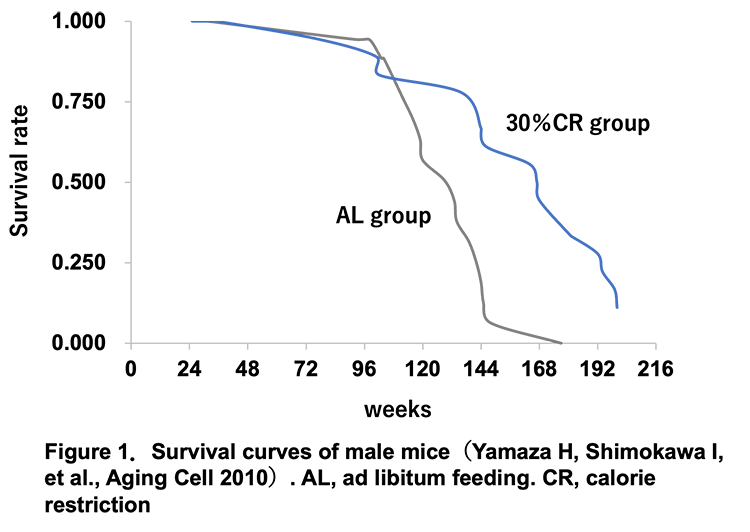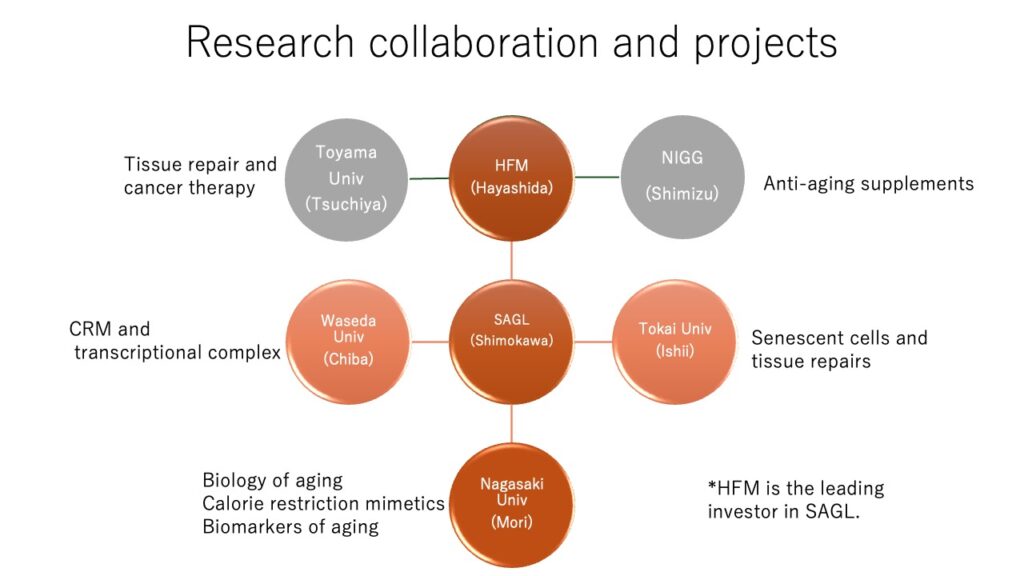Regulating Aging and Extending Healthy Lifespan through Calorie Restriction
As people age, their body functions deteriorate, leading to diseases such as cancer, cardiovascular disease, dementia, and ultimately death. This age-related deterioration of the body is called aging. The simplest way to delay aging and extend the lifespan of laboratory animals is to limit their energy intake with essential nutrients. This method is called dietary energy or caloric restriction. In many experimental animals, from nematodes and mice to rhesus monkeys, calorie restriction has been shown to delay various aging-related physiological declines and extend lifespan compared to freely-fed groups. Figure 1 shows the results of a mouse lifespan study conducted by Shimokawa’s group at Nagasaki University School of Medicine. Compared to freely-fed mice, mice with 30% caloric restriction significantly extended their lifespan. For example, at a survival rate of 0.250 (3/4 of the population dead and 1/4 alive), the lifespan of the freely-fed group is 144 weeks, and that of the calorie-restricted group is 192 weeks. This means that life expectancy is increased by 33%. In addition to extending lifespan, calorie restriction suppresses various diseases, including cancer. In the lifespan study shown in Figure 1, pathological analyses of mice that died spontaneously revealed that 94% of the free-fed mice had cancer, mostly malignant lymphoma. In comparison, only 16.7% of the calorie-restricted mice had cancer.

Experimental trials for two years have also reported that 10-20% caloric restriction can be done safely in healthy humans of standard build (i.e., not obese) (Walford RL, et al. J Gerontol A Biol Sci Med Sci. 2002; Ravussin E et al., J Gerontol A Biol Sci Med Sci. 2015). Again, this is based on the intake of essential nutrients. The effect on human life expectancy is unknown, but changes in cardiovascular disease risk factors, for example, are predicted to lead to an increase in healthy life expectancy. However, it is challenging for many people to restrict food intake for long periods. Those who have failed at dieting and experienced rebounding can understand. Animals are genetically set during evolution to overeat. They overeat when food is abundant and store it in their bodies as fat, and when food resources are depleted, they must break down the fat to survive, or they would not be able to survive in the natural world. Ironically, the traits acquired to survive the harsh natural world cause obesity and lifestyle-related diseases in today's food-abundant society.
Compounds or drugs that have effects similar to calorie restriction without calorie restriction may be able to delay aging. Such substances are called calorie restriction mimetics (CRM). We have established a joint venture, SAGL, to explore and evaluate the function of CRMs. By collaborating with universities and research institutes, we aim to gain a deep understanding of aging mechanisms and apply aging control methods to clinical practice. We also wish to contribute to extending human healthy life expectancy in aging societies.
Joint research

